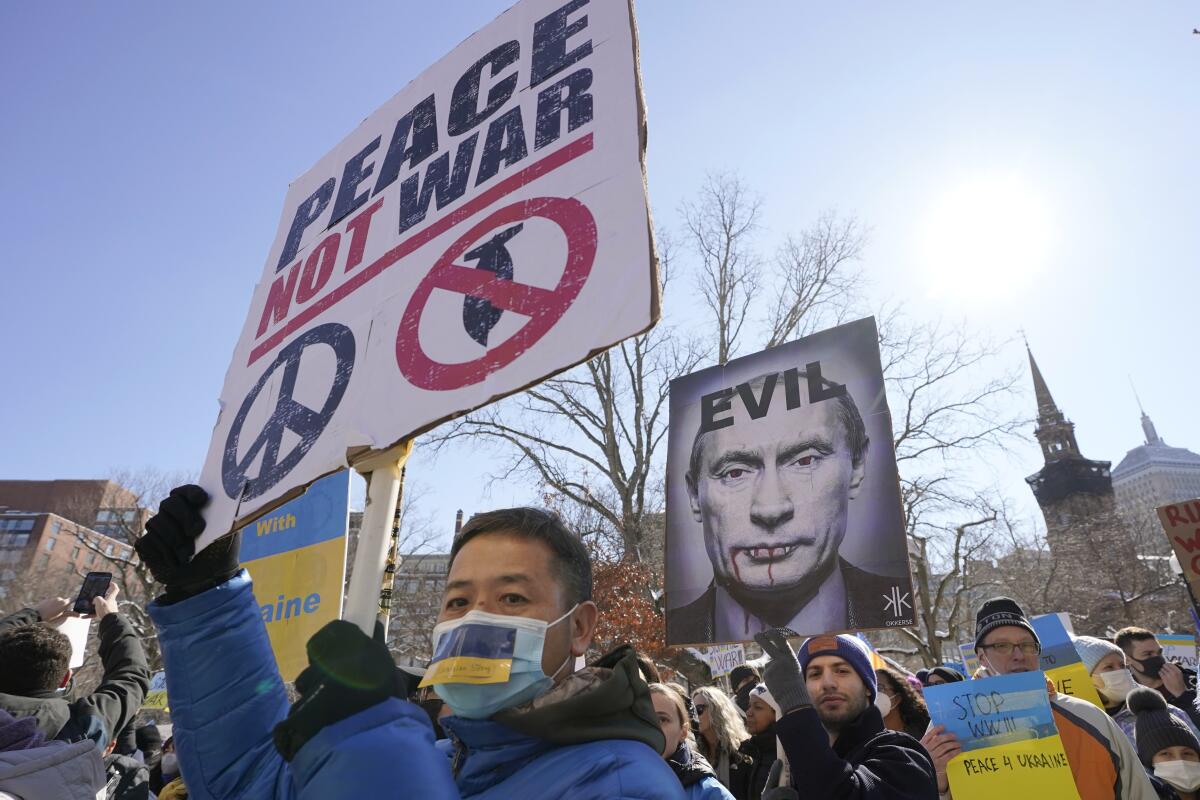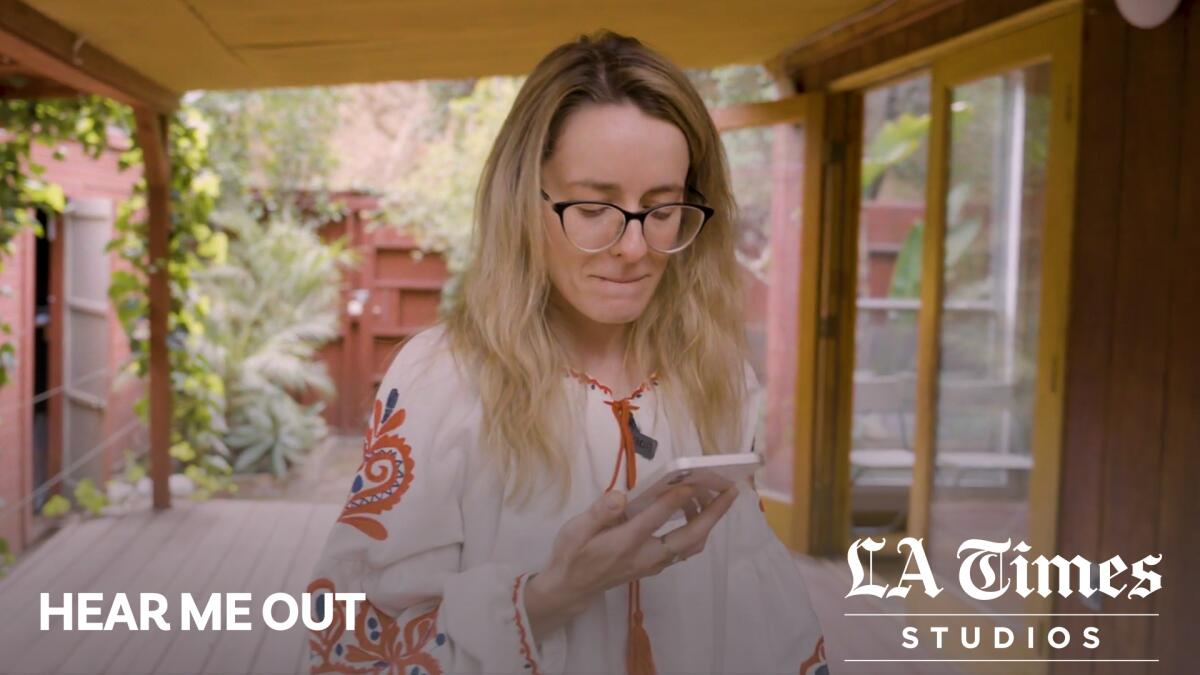Opinion: Of course Putin is killing innocents. Thatâs what authoritarians do

Good morning. Iâm Paul Thornton, and it is Saturday, March 12, 2022. Letâs look back at the week in Opinion.
Every now and then, I publish a letter in The Times that distills a dizzying, complicated topic into an essential, simple but hard-to-describe truth. One such letter, about Russiaâs attack on the Ukrainian government and people, was printed Thursday, and it contains a devastating reality check for anyone who might have been unbothered by the global democratic backsliding that preceded this war:
âThank you, President Zelensky, for showing us what courage and devotion to freedom is. And thank you, President Putin, for showing us the dark lie behind authoritarianism. Trump and his admirers like to think authoritarianism is about order and moral clarity. Itâs really about refugees and suffering and death.â
In a few simple sentences, that letter says so much â about the anti-democratic forces at work in our own country, the lies that fascism passes off as solutions, and the very real and needless human suffering that isnât a byproduct or a bug of authoritarianism, but a central feature.
Itâs this pointless suffering thatâs the subject of our latest âHear Me Outâ video spotlighting The Timesâ letter writers. This video features Victoria Pidlisetska, a Ukrainian in Los Angeles who wrote a letter to The Times at the start of Russiaâs attack imploring the world to pay attention to her countryâs struggle for survival.
Pidlisetskaâs letter was a stirring declaration of Ukraineâs desire to remain free; her video, however, betrays a much more stressful, somber existence amid war back home. She is seen pacing with her phone in hand, coiled by anxiety as she tries to reach her family, sobbing as she describes a 3-year-old child of a friend making a bed in a bomb shelter. She shares a video from her mother of an infant in a stroller being soothed by a uniformed Ukrainian border guard gently singing their national anthem. Over the phone, her father mentions only napping but not really sleeping or resting over the last four days. Food, water and electricity are scarce. Elderly grandparents may not be able to flee if it comes to that.
I implore you to watch the video and get a sense of what war does to people who have no control over their fate. Also, really give the pointlessness of this suffering some thought, because there is no multi-generational factionalism at play here, no long-simmering societal tensions exploding into war â just another paranoid authoritarian inflicting more ârefugees and suffering and deathâ on the world.

This war is brought to you by fossil fuels. Russia is a petrostate, meaning it gets most of its revenue from oil and gas extraction. It holds sway over much of Europe, which relies on imported Russian gas to power electricity plants and heat homes during the winter. Banning dirty energy from Russia is a righteous move, says The Times Editorial Board, but it also underscores the need for the U.S. to immediately transition away from fossil fuels: âThe ban should make it clearer than ever how urgently we need to accelerate renewable energy and hasten the end of fossil fuels that empower autocrats and are incompatible with a safe and secure planet.â L.A. Times
Speaking of fossil fuels, gas is getting (a lot) more expensive in California, and Gov. Gavin Newsom has said heâll have a plan for that. But if heâs going to soften the blow on consumers, why focus only on gas prices? His dangling of a gas-tax rebate for Californians during his State of the State address leaves out people who have been hit by skyrocketing food prices, especially if checks end up going out only to drivers. Says the editorial board: âItâs understandable that Newsom and other politicians, including those in swing districts where rising gas prices are a political liability, want something concrete to point to and spin to their political advantage. But that should not skew their priorities or distract from the need to extend relief to all Californians who need it.â L.A. Times
Former President Trumpâs praise of Putin is repugnant but unsurprising. Jonah Goldberg puts the ex-presidentâs initial admiration for the Russian leaderâs posture toward Ukraine into context: âOverlooked in the bloody days since his initial celebration is how utterly wrong Trump was about the man he claims to know âvery, very well.â Trumpâs problem is the problem with all power worship. It clouds the mind and corrupts the soul, rewriting not just objectivity but moral calculus too. As Orwell observed, power worship leads us to believe that âwhoever is winning at the moment will always seem to be invincibleâ so any moral objections are seen as not just folly, but the whining of suckers and losers.â L.A. Times
Enjoying this newsletter? Consider subscribing to the Los Angeles Times
Your support helps us deliver the news that matters most. Become a subscriber.
Putinâs diaspora will echo 1939âs, but going in the opposite direction. Daniela Gerson and her wife both have grandparents who fled Poland before the Nazi invasion and made their way to Lviv, Ukraine. Their hope of visiting that part of Europe to connect with their ancestorsâ history was upended by, well, more recent history: âFor more than a decade weâve wanted to visit our ancestral homeland. The plan at last was set â and we hope it still is â in May, we are to arrive in Zamosc, Poland, birthplace of three of our grandparents, stop by the nearby village where the fourth came from, and then drive two hours east to Lviv. But just when you think you are studying history, you find that you are living it. Except now, the refugees are fleeing in the opposite direction.â L.A. Times
They sold us processed food. Now theyâre selling us weight-loss programs. The food industry that hooked Americans on processed junk is now turning around and cynically selling us cures for the obesity and ill health they caused. Journalist Michael Moss says itâs time for regulators to treat food makers like tobacco companies: âFor decades, the tobacco industry evaded responsibility for deaths caused by smoking-related illnesses, by arguing that the fault lay with smokers. This strategy fell apart in the mid-1990s, when, after decades of research produced scientific evidence showing that nicotine is addictive, the companies began losing lawsuits brought by smokers. Jurors eventually stopped believing that smoking was entirely a matter of personal responsibility. Until the day comes when regulators and the public conclude that processed food can be just as addictive, of which I am already convinced, weâre going to continue to hear that this industry-made disaster is all our fault.â L.A. Times
Stay in touch.
If youâve made it this far, youâre the kind of reader whoâd benefit from subscribing to our other newsletters and to the Times.
As always, you can share your feedback by emailing me at [email protected].
A cure for the common opinion
Get thought-provoking perspectives with our weekly newsletter.
You may occasionally receive promotional content from the Los Angeles Times.




